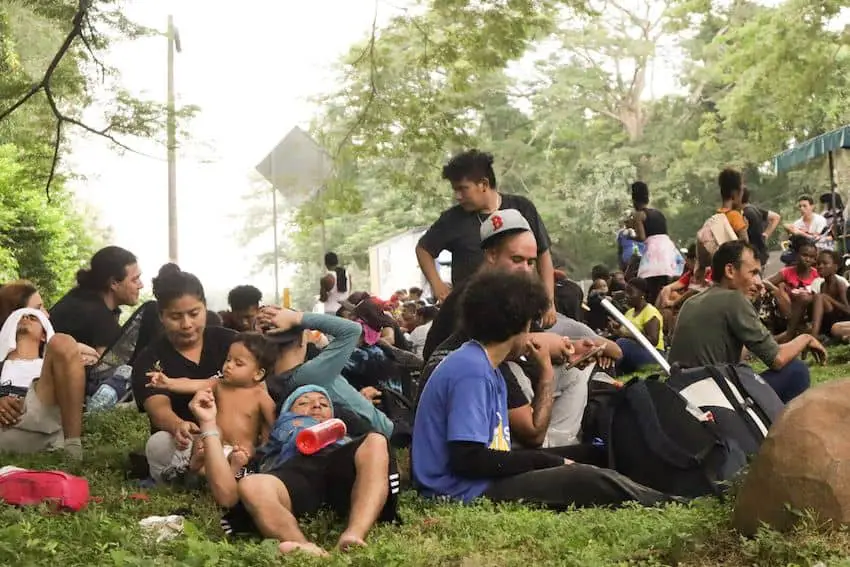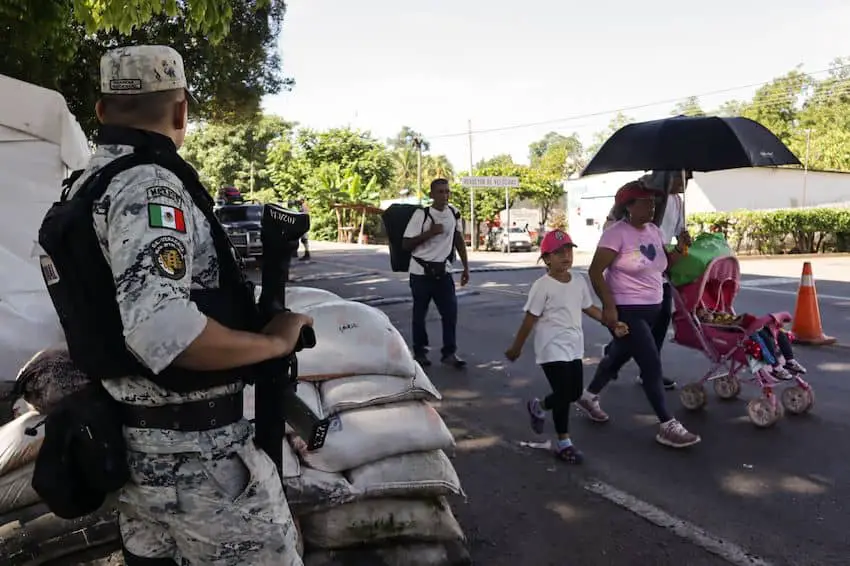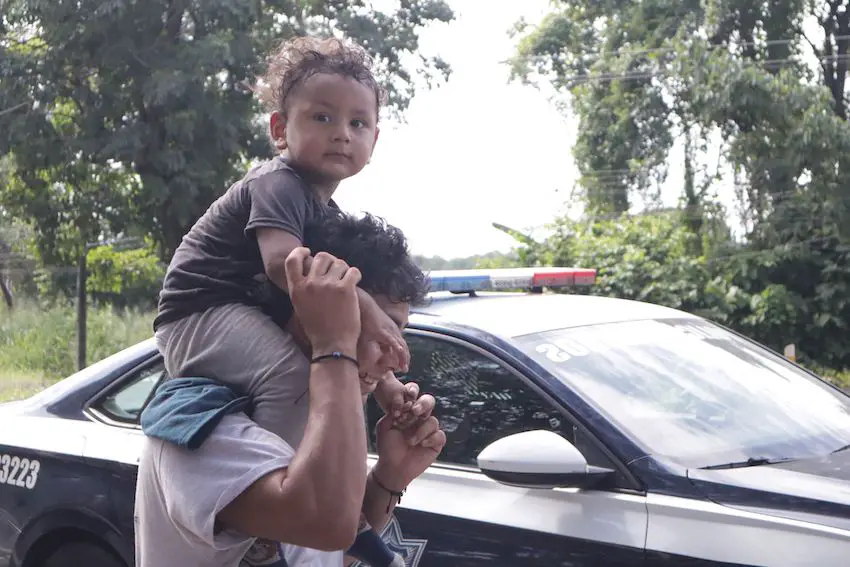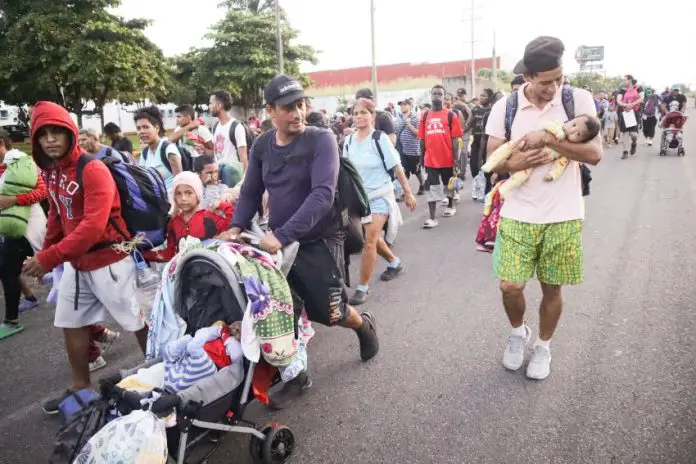A migrant caravan made up of some 1,000 people left Tapachula, Chiapas, on foot on Sunday, eight days after another caravan departed the same city.
The migrants, nationals of various countries including Venezuela, Haiti, Ecuador, El Salvador and Honduras, aim first to reach Mexico City before continuing the journey to the Mexico-United States border.

On Sunday, they walked around 26 kilometers from Tapachula to reach the town of Huehuetán, where they spent the night.
The migrants told media outlets that they decided to leave Tapachula — located near the border with Guatemala — due to a lack of jobs and insecurity in southern Mexico, among other factors.
They also said they had become fed up with waiting for appointments with United States immigration authorities, which migrants have been attempting to schedule from southern Mexico using the U.S. government app CBP One.
In late August, the Mexican government said that bus services from Tapachula and Villahermosa, Tabasco, to the U.S. border would be provided to migrants who had already been granted an asylum appointment by U.S. authorities. But the appointments are proving hard to get.
“We’re leaving because there is no work here. We don’t have money to pay rent, the appointments are taking too long, we need to advance,” Mario Hernández, an Ecuadorian migrant, told the newspaper La Jornada.
Álvaro Batista, a Colombian man traveling with his family, defended the right of migrants to travel through Mexico to seek asylum in the United States.
“What we’re doing is not at all illegal,” he told the news agency EFE.

Batista called on the National Guard to provide “support” to the migrant caravan as they headed north, even though that security force is better known for detaining migrants.
He indicated that he and his family joined the migrant caravan for safety reasons, saying, “It’s better to travel in a group than alone, especially for women and children.”
Another Colombian man told the newspaper Milenio that he and the other migrants are “vulnerable people” who “simply want God to lead” them on their journey through Mexico.
However, the migrant, identified only as Guillermo, also called on President Claudia Sheinbaum to lend them a “hand … in order to be able to continue.”
Other migrants called for health workers to accompany the caravan, which includes pregnant women as well as people from countries beyond the Western Hemisphere, such as Nepal and Afghanistan. Police officers in vehicles accompanied the migrants on Sunday.
Jeison, a Venezuelan man, said that he and other migrants left their countries due to a lack of work opportunities and high prices. Crime, political problems and climate change are among the other migration push factors for those seeking to reach the United States via Mexico.
The departure of the 1,000-strong migrant caravan on Sunday came after around 800 migrants left Tapachula on Oct. 5, four days after Sheinbaum was sworn in as Mexico’s first female president.
The first caravan is currently in northwestern Chiapas, not far from the state’s border with Oaxaca.
La Jornada reported that another migrant caravan is currently being organized with plans to leave Tapachula this coming Sunday.
It remains to be seen whether the first two migrant caravans of the Sheinbaum presidency achieve their ultimate goal of reaching the United States’ southern border. One thing is certain: their journey won’t be easy.
Migrants face a range of risks on the road
Migrants typically walk, hitch rides on trucks and jump aboard freight trains to get to the Mexico-U.S. border.
The journey is a dangerous one. Migrants have been involved in countless truck and train accidents in Mexico, and are frequently preyed upon by criminal groups, whose members have been known to forcibly recruit men and rape women.

Traveling in a large caravan might make the trip safer, but such groups typically break up as they move through the country.
Migrants also run the risk of being detained in Mexico, or the United States, and deported back to their country of origin.
At least one member of the caravan that left Tapachula on Sunday already knows that risk well. Honduran Carlos González told La Jornada that he was deported two months ago when he attempted to seek asylum in the United States.
As a result of a new United States border policy that took effect in June, it is easier for U.S. border officers to send migrants back to Mexico or their countries of origin, even if a migrant believes they have a worthy asylum claim.
The number of migrants attempting to illegally enter the U.S. via Mexico declined significantly after the implementation of the policy, which prevents migrants from making asylum claims at the U.S.-Mexico border at times when crossings between legal ports of entry surge.
González, a 35-year-old former soldier, said it wasn’t possible for him to stay in Honduras because he has received threats from gangs. His wife and daughter are already in the U.S.
“I want to see my daughter, … she’s eight. She [and my wife] escaped from our country two years ago because they were threatened by the 18th street gang,” he said.
Sheinbaum committed to AMLO’s migration strategy
Earlier this month, shortly after the Mexican army shot and killed six migrants in Chiapas, President Sheinbaum said that her government was committed to respecting the human rights of migrants and addressing the root causes of migration.
Former president Andrés Manuel López Obrador frequently made the same remarks during his six-year term in government.
Speaking on Oct. 4, Sheinbaum acknowledged that the government has a strategy to stop migrants from reaching the northern border and crossing into the United States. She recognized that the strategy includes “repatriation flights” or deportations.
While the restrictive border policy implemented by the Biden administration in June has been cited as a major factor in the reduction of migrant encounters at the Mexico-U.S. border, USA Today reported on Sunday that Mexico was “the U.S. government’s secret weapon in cutting illegal crossings.”
“Mexico is holding the line, analysts say, thanks to a carefully negotiated — but unwritten — agreement between neighbors, executed late last year by the Biden-Harris administration,” the newspaper reported.
“It’s held, they say, because it’s in Mexico’s economic interest to keep the border chaos-free and exports flowing north. And because the political stakes are high for Mexico in the upcoming U.S. presidential election.”
With reports from EFE, Milenio, La Jornada, Forbes México and AFP
